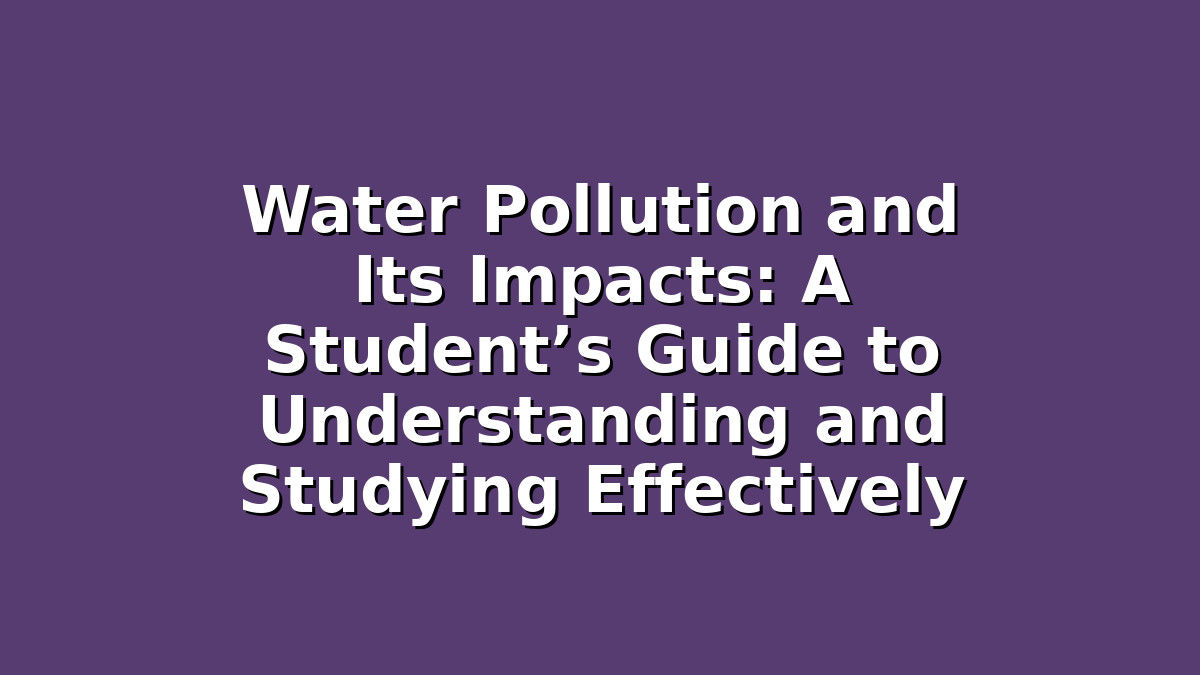Water pollution is one of the most pressing environmental issues faced by our planet today. As a student preparing for exams or working hard to understand important scientific concepts, it’s essential to grasp what water pollution is, how it affects ecosystems and human health, and why it matters for our future. This article will not only explain the key facts about water pollution but also provide helpful study tips to make your learning process more efficient and less stressful.
What Is Water Pollution?
Water pollution occurs when harmful substances—such as chemicals, waste, or microorganisms—contaminate water bodies like rivers, lakes, oceans, or groundwater. These pollutants can come from various sources, including industrial discharge, agricultural runoff, sewage, and plastic waste. When water is polluted, it becomes unsafe for drinking, harms aquatic life, and disrupts natural ecosystems.
Understanding the causes and effects of water pollution is crucial for students, especially those preparing for exams in science, environmental studies, or geography. This foundational knowledge not only helps you score well but also raises awareness, encouraging responsible actions toward the environment.
1. The Environmental Impact of Water Pollution: How to Study Complex Concepts
Water pollution affects ecosystems in multiple ways. Contaminated water harms aquatic plants and animals, reduces biodiversity, and can lead to the collapse of entire ecosystems. For example:
– Eutrophication: Excess nutrients from fertilizers cause algae blooms, which deplete oxygen in the water and kill fish.
– Toxic Substances: Chemicals like mercury and lead accumulate in water bodies, poisoning wildlife.
– Plastic Pollution: Microplastics threaten marine species and enter the food chain.
Study Tip: When tackling complex environmental concepts like these, try breaking the information down into smaller chunks. Use diagrams or mind maps to visualize processes such as eutrophication or the food chain. This approach helps you remember details better and understand cause-effect relationships.
2. The Impact on Human Health and Society: Making Real-World Connections
Water pollution doesn’t just affect nature—it also poses serious risks to people. Polluted water can lead to diseases such as cholera, dysentery, and typhoid. Contaminated drinking water affects millions worldwide, especially in developing countries. Additionally, water pollution impacts industries like fishing and tourism, leading to economic losses.
When studying these human impacts, it’s helpful to connect the facts to real-life examples. For example, you might research a recent water pollution incident or a case study from your country. This makes the topic more relatable and easier to remember during exams.
Study Tip: Try explaining these impacts out loud to a friend or family member. Teaching others is a powerful way to reinforce your own understanding. You can also create flashcards with key terms and case studies to review regularly.
3. Prevention and Solutions: Empowering Yourself Through Knowledge
Understanding how to prevent and control water pollution is an important part of your studies. Solutions include:
– Wastewater Treatment: Cleaning sewage before releasing it into water bodies.
– Regulation and Policy: Laws that limit pollutants from factories and farms.
– Community Efforts: Clean-up drives, reducing plastic use, and promoting awareness.
As a student, learning about these solutions can inspire you to take action. Moreover, exam questions often focus on problem-solving, so knowing prevention methods can boost your answers.
Study Tip: Create a list of prevention techniques and categorize them by type (governmental, technological, individual action). Use comparison tables or charts to organize information visually. This method helps you quickly recall details and understand their effectiveness.
How to Stay Motivated While Studying Environmental Topics
Studying environmental issues like water pollution might sometimes feel overwhelming because of the vast amount of information. Here are some tips to keep your motivation high:
– Set Clear Goals: Break your study sessions into manageable tasks, such as focusing on one section at a time.
– Use Multiple Resources: Combine textbooks, documentaries, and online articles to keep learning fresh and engaging.
– Join Study Groups: Discussing topics with peers can deepen your understanding and keep you accountable.
– Relate to Your Life: Think about how water pollution affects your community or daily life.
Conclusion: Your Role as a Student
Water pollution is a complex but vital topic that connects science, health, and society. As a student, gaining a solid understanding prepares you not only for exams but also for becoming an informed global citizen. Using the study tips outlined here—breaking down information, making real-world connections, and organizing prevention methods—can make your learning process easier and more effective.
Remember, every bit of knowledge you gain empowers you to make wise choices and maybe even inspire change in your community. Keep your curiosity alive, stay organized, and approach your studies with confidence. You’ve got this!

Responses